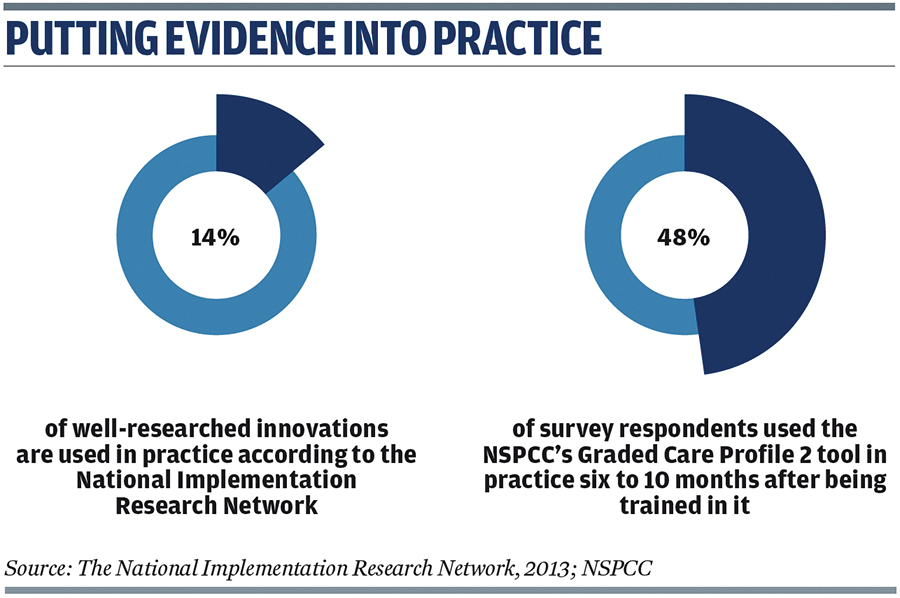Evidence and Impact: Scaling up programmes
NSPCC
Tuesday, September 25, 2018
The latest in a series about emerging safeguarding practice looks at how the NSPCC is supporting the social care and health sectors to implement evidence-based services for children and families.

The NSPCC works with children, young people and families who need help across the UK. Its services aim to protect children today, prevent abuse tomorrow and support wider efforts to make child cruelty a thing of the past. To improve understanding of best safeguarding practice, the NSPCC publishes evaluations of its services and interventions, and undertakes research and literature reviews. These are published on the NSPCC website to contribute to the evidence on what works to protect children and families.
The NSPCC has in recent years learned a huge amount about how to innovate, evaluate and share learning from the services it delivers directly to children and families. By learning what works through developing, delivering and testing services, it can then "scale up" services, helping other organisations to deliver this provision, with the ultimate goal of keeping many more children safe.
Annually, service delivery organisations invest millions of pounds in research into what works in child protection and social care, resulting in evidence-based programmes that have been proven to be effective. Comparatively little is invested in successful implementation of evidence-based programmes, and taking them to scale. The development and sharing of evidence in itself is not enough to encourage the adoption of evidence-based practice. Publication of research reports, knowledge exchange and manuals detailing "what works" may represent what is known about effective interventions, but without successful implementation, these innovations do not have the real-world impact for the children and families for whom they were developed. People cannot benefit from evidence-based programmes they don't receive.

Implementation science
Several major reports have highlighted the gap between our knowledge of effective treatments (in social care and medicine) and services currently being received by service users and patients. These reports agree that we know much about interventions that are effective but make little use of them to help achieve important outcomes for children, families and adults nationally (Fixsen et al, 2005).
Implementation is defined as a specified set of activities designed to put into practice an activity or programme of known dimensions. Implementation science is the scientific study of methods to promote the systematic uptake of research findings and other evidence-based practices into routine practice to improve the quality and effectiveness of evidence-based programmes across a range of sectors.
The National Implementation Research Network Active Implementation Hub site notes that only 14 per cent of well-researched innovations are used in practice and it takes 17 years to accomplish that modest level of use without active implementation support.
The NSPCC's Scale-up Unit was set up to work with the health and social care sector to promote active and sustained use of its evidence-based programmes. The Scale-up Unit is developing expertise in implementation providing a range of pre- and post-implementation support, consultancy and training to organisations wanting to adopt an NSPCC evidence-based programme. Their approach is grounded in implementation science and uses a range of frameworks and tools to underpin scaling and implementing.
A survey of respondents using the Graded Care Profile 2 neglect assessment tool said they used it in practice six to 10 months later after being trained. Graded Care Profile 2 is being scaled up by the NSPCC, with implementation support to help embed its use.
Putting implementation science into practice
The NSPCC has evaluated the implementation process for four of its scaled-up services to find out what it takes for implementation to be successful. This is a summary of what the evidence from the "early adopter" sites experienced about effective implementation.
Preparing the ground
Implementing in the "real world" is challenging. Health and social care partners cited challenges around resourcing, capacity, change management and precarious funding. The more the ground can be prepared to make programmes work the better.
For example, a theory of change examines ideas or assumptions of how change is expected to happen and provides a summary of the approach and impact the programme is trying to achieve. A theory of change is used to define the building blocks used to reach goals. It causally links inputs and activities to a chain of intended, observable outcomes (Rogers, 2008). For organisations and people involved in delivery of a programme, a theory of change allows them to better understand the purpose of an intervention and how it is achieving its objectives (Dhillon, 2018). Ensuring you have a well-articulated theory of change at the start of the programme will support scale-up later on.
Spreading programmes
A purposeful and proactive approach to using implementation science is needed to disperse evidence-based programmes.
Leadership and champions can locally contribute to success. There are mixed views in implementation science about the use of champions, particularly in sectors that are prone to high turnover. However, the NSPCC found that champions do help innovations to spread within an organisation and that this is contagious. Champions' passion helps others within the organisation to see the impact of the evidence-based programme and they take up the mantle.
The development of champions cannot be forced. There is a need to nurture people who have a natural interest or passion for the programme and support them to support others - peer support can be as valuable as management support.
Helping programmes embed
The conditions into which a programme is scaled will either support it to thrive or cause it to fail. Many of these must be established at the outset, through the implementation support provided and by getting early engagement with external organisations along with strategic buy-in.
It is critical that from the start of any conversations with the potential adopting organisation that you get buy-in from strategic leads. Without a champion at this level who is willing to invest in the programme and advocate for it, it may struggle to become embedded. In fact, it is essential to get buy-in across the organisation, from senior staff through to operational frontline staff and that they understand their role in making this programme a success.
Supporting programmes to flourish
The development of an evidence-based programme has an active role to play in supporting organisations to successfully implement and sustain the delivery of the evidence-based programme. This includes licences and contracts that are clear on the core and flex of the evidence-based programme, ability to support local solutions and the creation of shared learning spaces to share good practice. There are a range of activities that the NSPCC has found useful to support evidence-based programmes to flourish once they are adopted. These include:
- Steering groups, encouraging adopting organisations to set up their own steering group to support the implementation of the programme and monitor progress against performance indicators for example
- Community of practice events and shared learning spaces. These have been very helpful in enabling adopting organisations to come together to share best practice, challenges, support solutions and to share successes. Communities of practice have been facilitated by the NSPCC until they become self-sustaining. These take place face to face or virtually.
- Refresher training, such as e-learning for people wanting to refresh their knowledge and skills annually for a specific evidence-based programme.
It takes several years for evidence-based programmes to become established within the organisations that have adopted them. We need to continue learning about services as they bed into their new settings.
TOP 10 TIPS FOR SCALING UP
1. You need a good product to take to scale
- A good level of relevant evidence
- A product that is needed in the market
2. You need a good team to take services to scale
- Implementation managers with the skills and ability to implement
- Regional and national coverage
- Ability to build and sustain relationships
3. Know your market
- Market insights are critical - who are you selling this to?
- What are their drivers?
- How will this solve their problems?
4. Evidence-based programme ‘must haves'
- Teachable
- Learnable and
- Doable by others
5. Readiness
- Assessment of readiness prevents time wasted, both by the scaling organisation and the adopting organisation
- It can help identify gaps that the scaling organisation can support them to fill
6. Active implementation support
- The scaling organisation needs to provide a package of support, not just training
- Face-to-face support as well as virtual
7. Strategic and operational buy-in
- From senior leaders through to operational staff, buy-in at all levels is key
- Self-selecting champions, people bring the passion which breeds success
8. Flexibility vs fidelity
- You need clear core components of your evidence based programme
- There has to be some level of flexibility for local context
- Provide support to adapt to adopt
9. Resources, processes and systems
- Be clear with the adopting organisations about what they need to make it a success
- Support them to develop their own implementation plan and take ownership of it
10. Scaling and implementing takes time
- For the scaling organisation it can take a long time to saturate the market
Click here to download this article on scaling up programmes as a PDF
FURTHER READING
- NSPCC animation about how it develops and scales services for children and families https://youtu.be/DrlTFP_m-KY
- What Have We Learnt From Scaling Up Services?, Romanou, 2018
- Implementation Evaluation of the Scale-up of Graded Care Profile 2, Smith et al, 2018
- Implementation Evaluation of Baby Steps Scale-up, Johnson and Anderrson, 2018
- Implementation Evaluation of Domestic Abuse, Recovering Together Scale-up, Stokes, 2017
- Evaluation Report on Implementing the Reunification Practice Framework, Farmer and Patsios, 2016




